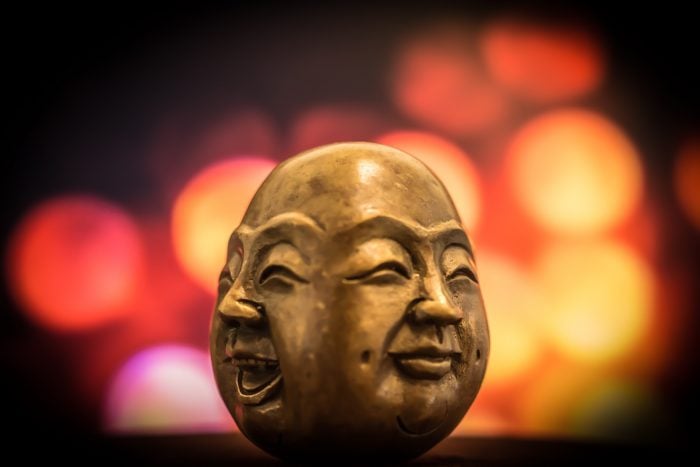Happiness is a noble pursuit yet it seems so elusive.
Just when we think we’ve grabbed it by its tail to cage away, poof, it’s slipped through our fingers once again.
Yet, we haven’t given up on it. We’re even taught to pursue it through society’s recommended routes—routes that usually turn into dead ends as they’re destined to do. This is because many of these routes are paved with selfishness and self-cherishing which, more than anything, make us miserable.
Maybe it’s time we admit on a societal level that we just don’t know what will make us happy.
Buddhism steps in to offer us an idea: maybe chasing self-centered forms of happiness is actually what’s making us miserable. Maybe real happiness lies in the sympathetic joy of others—mudita.
Mudita translates from ancient Pali to “sympathetic joy,” a term which may seem confusing like most Pali translated to English terms are wont to be. More accurately the term means something like, “sharing in the joy of others.” It is the direct opposite of jealousy, envy, and greed. In modern-day Buddhism, mudita is packaged to students as the wellspring of joy—a joy that’s available to us at all times, regardless of our circumstance.
We can also describe mudita as appreciative joy, or sharing in the good fortune of others.
Cultivating Mudita
Mudita is one of the Four Immeasurables in Buddhism, or the Brahmavihara. These are the mental states that we’re told by the Buddha to cultivate. Mudita is considered the most difficult. If you’ve ever tried to turn up the joy for another during a time of your own distress, then you are aware of why this is.
The way to cultivate mudita is through a meditation and mindfulness practice wherein we can uproot our defilements—our unskilled mindstates—and replace them with more skilled ones like sympathetic joy. These are the mindstates that the Buddha says are necessary for reaching enlightenment. More applicable to us, they’re the mindstates that are necessary for happiness, peace, and contentment.
This might seem like a difficult task. Don’t worry. Taking refuge in the Buddha, the Sangha, and the Dharma—The Triple Gem—you will find that they’ve provided 2,000 years of helpful tips and descriptive practices for us.
Some of these practices include meditation, mindfulness, and other practices of the heart which conjure up feelings of love, compassion, gratitude, and appreciation. One such heart-based practice that is powerful in cultivating mudita is metta, or loving-kindness.
Practicing metta is a way to extend love and goodwill to yourself and others, and it’s as easy as saying a prayer-like mantra to yourself, for yourself or for others.
“May I be truly happy.
May I be at peace and at ease.
May I be in good health.
May I be safe from danger.
May I be free from suffering.”
You can switch the “I” in the metta prayer for whoever you’d like: friend, loved one, stranger, or even a foe. If you’re feeling especially generous, you can extend it to “all beings everywhere.”
This is an excellent way to produce mudita from within.
Benefits of Cultivating Mudita
Cultivating sympathetic joy has a multitude of benefits on both our physical and mental well-being.
Promoting well-being
Happiness. Joy. Who doesn’t want to experience those feelings? Who would have thought that sharing in the joy of others promotes joy in ourselves? Plus, all of the physical and health benefits that are associated with well-being are good too.
Curbing feelings of jealousy and envy
Because of societal and cultural demands, it can be easy to fall victim to playing the comparison game. The truth is, we’re exactly where we need to be for our growth and highest potential and so are others. Practicing sympathetic joy helps us to share in the success of others, making it next to impossible to feel envious toward them.
Wisdom
Through cultivating mudita, our minds become peaceful and calm. We’re more focused due to not being bogged down by negative states. The Buddha taught that mudita was one of the ways to see the nature of reality clearly and to develop the insight that frees us from our suffering—achieving nirvana.
Boredom
Mudita is said to work against boredom. This makes sense. When we practice cultivating mudita the feelings we experience can be enthralling. It’s hard to feel bored while experiencing joy.
In a broader sense, this deals with us having to do things we may not want to do. If we can generate feelings of mudita through even the most mundane of tasks, we’re sure to bring a sense of liveliness into it or any of our activities.
~
We can all experience mudita first hand. Whatever your opinion on mudita, the Buddhist practice of sympathetic joy, cultivating it is certainly worth giving a shot. It’s not rooted in blind faith, it’s something that you can experience yourself and work toward, daily.
 Share on bsky
Share on bsky






Read 2 comments and reply